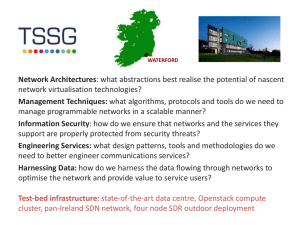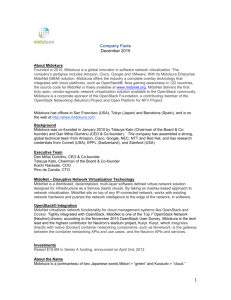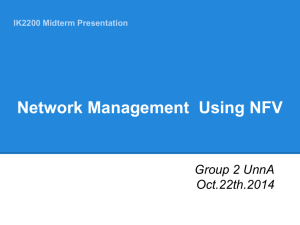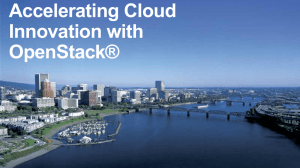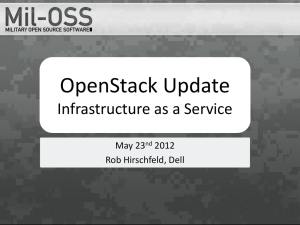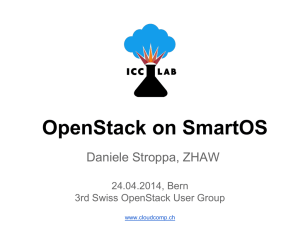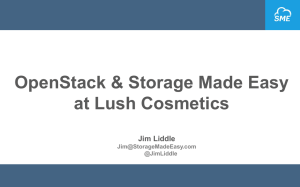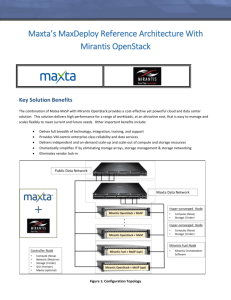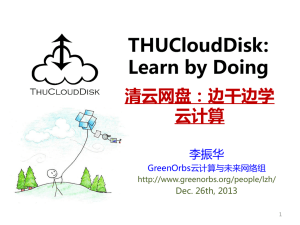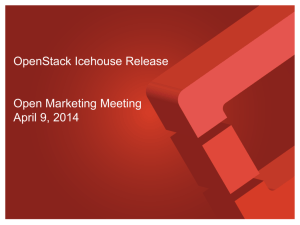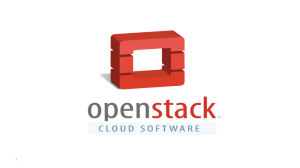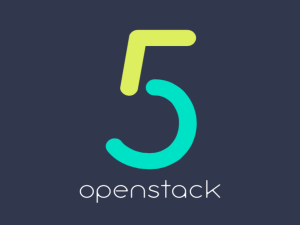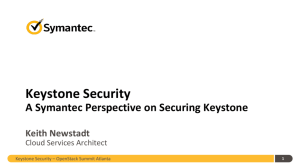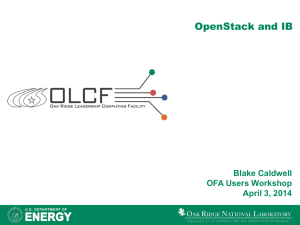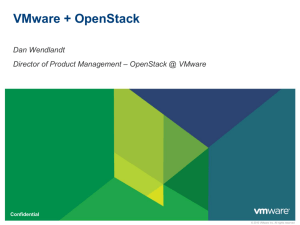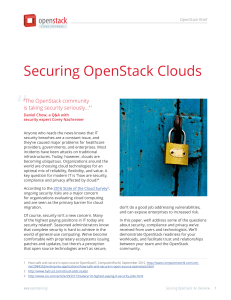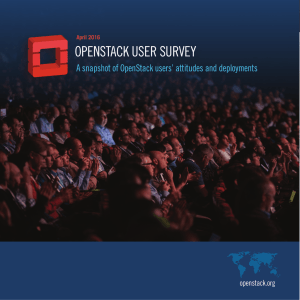Security on OpenStack : Auditing and Compliance
advertisement
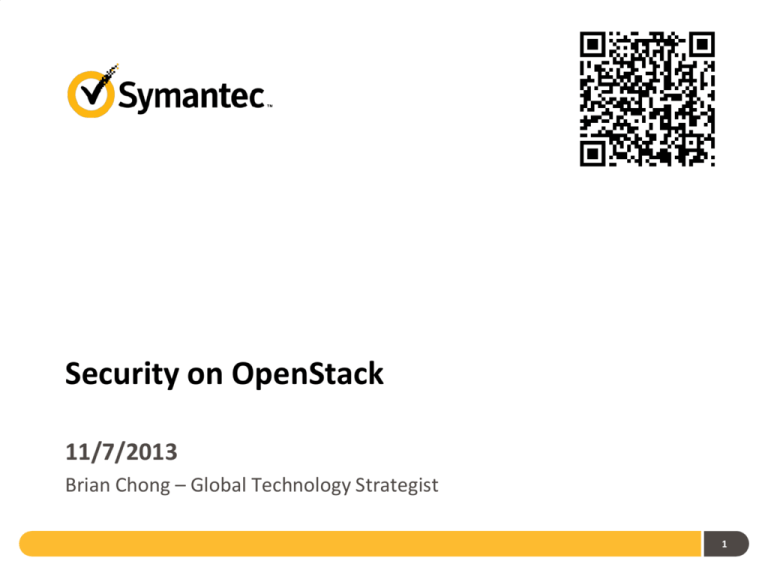
Security on OpenStack 11/7/2013 Brian Chong – Global Technology Strategist 1 Agenda • What is Symantec doing? • Security Concepts for Grizzly Release – Centralized Software Defined Data Center Management – Network Segmentation – Token/PKI Based Authentication – Distributed Policy Management – Auditing and Compliance • Areas of focus for Securing a OpenStack Deployment 2 About Symantec and Us About Symantec About Brian Chong • Making the world a safer place… • Enterprise system and data protection • Norton branded consumer protection (not just Antivirus) • Tackling the big problems • Pioneered the Big Data approach to malware detection • Significant cloud presence (Norton, MessageLabs, OCSP, etc.) • Infrastructure Architect for our OpenStack efforts • Security & Network Focused • Interested in securing OpenStack at all tiers SYMC Confidential 3 What is Symantec Doing? • We are building a consolidated cloud platform that provides infrastructure and platform services to host Symantec SaaS applications – An exciting “greenfield” opportunity to re-invent our cloud infrastructure with strong executive leadership support • Our development model is to use open source components as building blocks – Identify capability gaps and contribute back to community • We have selected OpenStack as one of the underlying infrastructure services layers • We plan to analyze and improve the overall security posture of OpenStack components • We are starting small, but will scale to thousands of nodes across multiple data centers Cloud Platform Engineering 4 Scope of Investigation • Version of OpenStack : Grizzly • Components : Nova, Neutron, Glance, Cinder, Keystone, Swift, Horizon • General : – Database : MySQL – AMQP : RabbitMQ – Hypervisor : KVM – Operating System : Ubuntu Cloud Platform Engineering 5 Security on OpenStack : Traditional Model (Defense in Depth) Application/Host Security Firewall Rules Load Balancer Filters Router ACLs 6 Security on OpenStack : Software Defined Data Center • Centralized Data Model for control access – All Control points are accessible by the applications that control the Data Center for elasticity of the service – All Services have access to change the system in relatively large ways (Compute, Network, Storage) to manage service SLAs – Layered Security is now much more difficult than before, which means stronger pinpoint security is more critical than before • Host based controls become more critical – Operating System – Hypervisor / Virtualization Driver – Console 7 Security on OpenStack : Centralized Model Security Sphere Security Sphere N Software Defined API Application Security Load Balancer Firewall Rules Filters Router ACLs 8 Security on OpenStack : Network Segmentation • BMC and IPMI functions : Control of Hardware components – Deny All except to specific participating Deployment Servers • Host/Admin : Control of Operating System – Deny All except to specific Jump Servers • Service API/Messaging : Control of IaaS, Messaging & Database services and Authentication – Deny All except to each physical interface on participating Servers • Private/Storage : VM to VM traffic and Storage or internal PaaS Services – Controlled by local Firewall Access (iptables per host or external Firewall) • Public : External Access outside of the Cluster – Controlled by Gateway/Load Balancer/Firewall 9 Security on OpenStack : Token/PKI Based Authentication • Token Expirations (assumes Caching) – Correlation of all changes in the distributed model with a issued Token • PKI Token Management – Signing Certificate Expiration – Signing Engine (HSM or SW) – Root CA Distribution • SSL Service Management – SSL Certificate Expiration for Services – Root CA Distribution – Private key generation and Management 10 Security on OpenStack : Distributed Policy Model • Definition of different roles and policies are defined in Keystone per tenant and globally • Each service has a policy.json file that lists out which defined role for that specific service has the capability to execute • Each service node should be synchronized for their specific policy files or a multi-service security model can be used for the same type of service – Each upgrade has to maintain and define new roles that are included in every release 11 Security on OpenStack : Distributed Policy Model Nova policy.jso n Role Definition KeyStone Role Name Neutron policy.jso n Role Definition 12 Security on OpenStack : Auditing and Compliance • Auditing – Sources : Message Queues, Log Files, Database • Message Queue Event Validation process • Log Parsers for Event Handling and Threat Detection • Database Triggers for Security Events • Compliance – Role to Policy Validation – Code Patching and Upgrade Versioning – User Information (Name, Password, Roles, etc) – IT Mgmt (ISO 27001, FISMA, FedRamp, etc) – PKI Key Management 13 Security on OpenStack : Auditing and Compliance • Example : Boot a Virtual Machine – Keystone (Log, Database) – Nova (Log, Message, Database) – Glance (Log, Database) – Neutron (Log, Message, Database) – Host (Log) – Horizon (Log, Database) • All of these events must be correlated to make sure that the proper rules and privileges were used during each command and against a CMDB to validate authorization 14 Areas of focus for Securing a OpenStack Deployment • Message Server and Queuing – Signing all Messages and Validating Authorization • Database Server and Instances – Encryption of Critical Columns • Certificate Management – Overall Management and HSM Integration • Distribution Verification – Signed Policy Distribution and Loading into all Services • 2 Factor Authentication / Single Sign On – Token Authentication with Single Sign On through Horizon 15 Questions? 16
